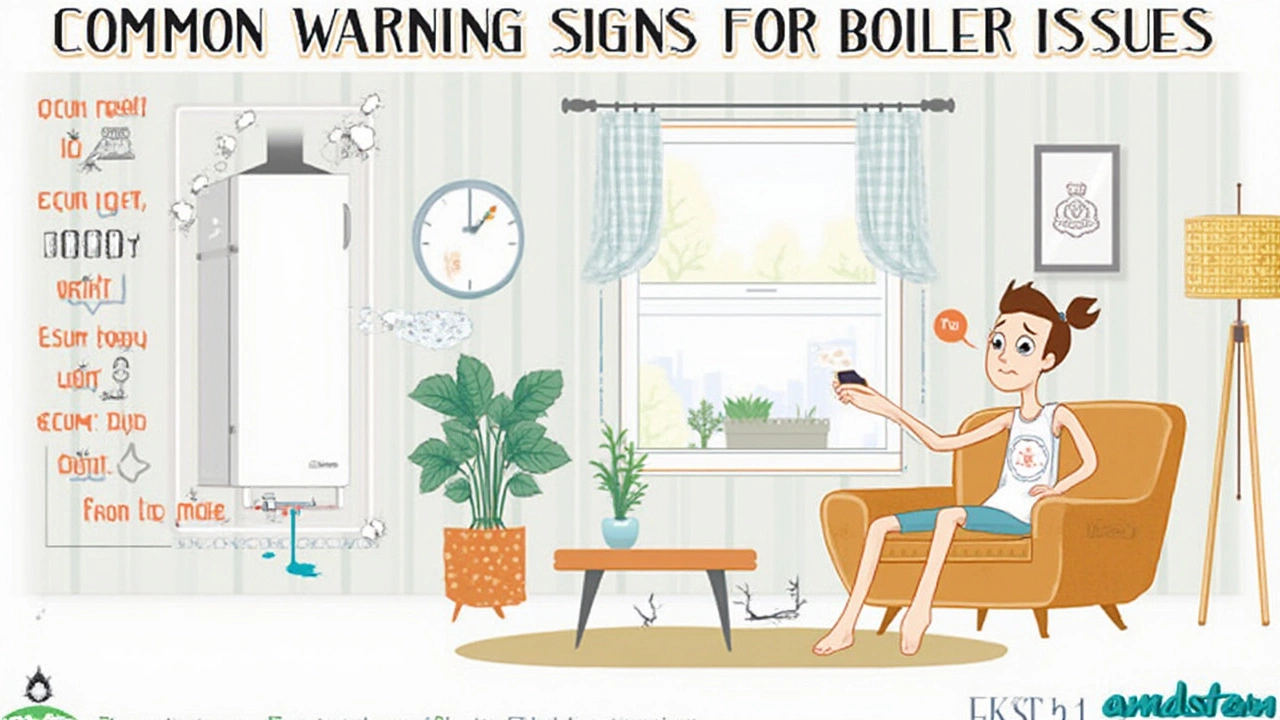Missed boiler maintenance can leave you cold—literally. Most people don’t think about their boiler until something goes wrong, then suddenly it’s all panic and no heat. The thing is, a well-maintained boiler runs safer, lasts longer, and keeps your energy bills down. Even a small issue ignored for a season can lead to expensive repairs or worse, complete failure in the middle of winter.
Your boiler needs more than just a quick dust-off. It’s got parts like heat exchangers and pumps that need checking, and things like leaks or pressure drops can sneak up quietly. You might not even notice anything wrong until the water's barely lukewarm or you hear weird banging noises from the basement. Regular maintenance helps catch these problems before they turn into disasters.
- Why Boiler Maintenance Matters
- Must-Do Annual Checks
- What Happens During a Professional Service
- DIY Tasks You Can Handle
- Warning Signs That Need Fast Action
Why Boiler Maintenance Matters
Skipping boiler maintenance usually backfires. Forget those stories about a “maintenance-free” boiler—every heating system, no matter how new, can act up if you ignore it. Breakdowns are way more common in boilers that don’t get regular care, and emergency calls often hit when it’s freezing outside and repair folks are busy.
Let’s talk money. Well-maintained boilers are up to 12% more efficient (according to Energy Saving Trust), which means less cash wasted on heating bills. On top of that, routine boiler servicing extends your boiler’s lifespan, sometimes by several years. That’s basically saving hundreds, if not thousands, just by keeping up with annual checks.
Safety is an even bigger deal. Gas boilers especially can leak carbon monoxide—a deadly gas you can’t see or smell. Around 60 people in the UK are killed every year by carbon monoxide poisoning from faulty gas appliances. Catching leaks, blocked flues, or clogged vents during boiler maintenance keeps your home and family safe.
- Prevents sudden system breakdowns when you need heat most
- Maintains high energy efficiency, slashing monthly bills
- Spots dangerous leaks or ventilation issues early
- Keeps boiler manufacturer warranty valid
If you rent, landlords are actually required by law (in most places) to get annual gas safety checks. Homeowners aren’t off the hook though, because missed boiler repair appointments can void your warranty and make selling your house harder down the road.
| Risk | Well-Maintained Boiler | Neglected Boiler |
|---|---|---|
| Breakdown frequency | Low | High |
| Heating bills | Lower | Higher |
| Safety risk | Low | High |
| Lifespan | 10-15 years | 7-10 years |
No matter how boring it sounds, a quick check every year makes life way easier and can actually help avoid the kind of disasters no one wants to deal with in the dead of winter.
Must-Do Annual Checks
If you want to keep your heating steady and avoid sudden boiler repair costs, an annual check-up isn't just a good idea—it’s a must. These checks pick up small problems before they blow up into big, expensive ones. Here’s what needs to be on your checklist every year:
- Pressure Check: Boilers shouldn’t be too high or too low on pressure. The sweet spot is usually around 1 to 1.5 bar when cold. Dropping too low can knock out your heating, while high pressure can lead to leaks and bigger issues.
- Leak Search: Look around the boiler and pipes for signs of rust, water stains, or drips. Even tiny leaks chew away at components and can wreck your system over time.
- Vents and Flues: Make sure nothing blocks the flue outside—birds, leaves, and dirt are regular troublemakers. A blocked flue isn’t just bad for your heating system; it can even be dangerous by letting carbon monoxide sneak back into your house.
- Pilot Light or Error Codes: If your boiler has a pilot light, it should burn a crisp blue. Any yellow or flickering means trouble. On digital models, check for error codes—don’t just hit reset and hope for the best.
- Radiator Bleed: Cold spots on radiators mean air is trapped. Bleed radiators to keep things efficient and your rooms warm.
- Condensate Pipe Check: This pipe removes waste water, but it’s a hotspot for blockages, especially in winter. A frozen or clogged condensate pipe can shut down your whole boiler system.
Ever wondered how much maintenance really pays off? Recent UK stats show that 60% of unexpected boiler repair calls in winter come from homes that skipped their yearly check. That’s a lot of freezing nights that could’ve easily been avoided.

What Happens During a Professional Service
A boiler maintenance visit isn’t just someone shining a flashlight and leaving a bill on your table. A qualified engineer gives your system a full checkup, looking over everything that could cause you trouble down the road. If you’re new to this, you might be surprised at how thorough the process is—and why it’s worth every penny.
Here’s what actually goes on during a typical boiler servicing appointment:
- Visual inspection – They’ll look for leaks, corrosion, or soot, which are early warnings of serious problems. Sometimes a small rust spot is a sign of something bigger brewing inside.
- Checking components – They test critical parts: burner, heat exchanger, and safety devices. If something’s not working right, they’ll spot it fast.
- Cleaning – Dust and grime build up inside. Technicians clean the main bits, like the burner and fan, so nothing clogs or overheats down the line.
- Gas and pressure tests – They measure the gas pressure and flow, then test the system for leaks. If gas levels are wrong, your boiler won’t run efficiently—or safely.
- Flue check – The flue releases dangerous gases. They make sure nothing is blocked and that fumes are venting outside like they should.
For modern boilers, they might also hook up digital analyzers. These gadgets catch things human eyes can’t: carbon monoxide, poor combustion, or hidden system faults. The law in many places even says only a certified pro should handle this—it’s not a DIY job.
| Check | How Often |
|---|---|
| Gas tightness & pressure | Yearly |
| Flue integrity | Yearly |
| Cleaning burner/exchanger | Yearly |
| Full component test | Yearly |
Good boiler repair techs will chat with you at the end, going over what they found and what to keep an eye on. Don’t just nod—ask questions if you’re unsure about anything. It’s your money and your heating on the line.
DIY Tasks You Can Handle
Not every boiler maintenance job needs a pro. There’s plenty you can do yourself to keep your system running without hassle. You don’t need fancy tools or deep mechanical knowledge—just a little care and some common sense.
Here are some basic boiler maintenance jobs you can tackle safely at home:
- Check the Pressure Gauge: Most modern boilers have a pressure indicator right on the front. The ideal range is usually between 1 and 2 bars (check your manual to be sure). If it drops below 1, your heating won’t work well. If it’s too high, you risk leaks. If it’s off, follow your manual to top up with water—just don’t go overboard.
- Bleed Your Radiators: If your radiators are cold at the top and hot at the bottom, air’s stuck inside. All you need is a radiator key. Just twist the valve at the top, let the air hiss out, and close it once water starts to dribble.
- Clear Out Clutter: Make sure there’s nothing blocking vents or pipes around your boiler. Keep at least 30cm of clear space—boilers need to breathe, and clutter makes things overheat.
- Check for Leaks: Take a look around (especially under and behind the boiler) for any wet patches, drips, or rust. Even a tiny puddle might mean a seal has gone bad.
- Listen for Odd Noises: A bit of humming is normal, but banging or gurgling? That’s a red flag and means you should call in a pro before things worsen.
- Test Your Thermostat: Sometimes boilers work fine, but your thermostat is off. Set the thermostat a few degrees higher and see if the boiler fires up. If not, it could be the batteries—or you may need a new thermostat.
How often should you do these checks? Every couple of months is a solid rule. But if you spot anything weird, don’t wait. For leaks, loud noises, or sudden loss of hot water, call for boiler repair straight away.
| Task | Recommended Frequency |
|---|---|
| Check pressure gauge | Monthly |
| Bleed radiators | Twice a year |
| Clear boiler area | Monthly |
| Inspect for leaks | Monthly |
| Listen for noises | Whenever heating is on |
| Test thermostat | Every season change |
Don’t try to open the boiler case or mess with the gas supply. Leave those jobs to a licensed boiler servicing pro. You can keep things running smooth just by staying alert and sticking to these simple steps.

Warning Signs That Need Fast Action
Some boiler problems just can’t wait. If you spot any of these issues, don’t mess around—shut off your boiler if you can and call a boiler repair pro right away. Waiting can make things worse and even dangerous.
- No heat or hot water: Obvious, right? If you’re getting only cold showers or your radiators won’t warm up, something major could be wrong—broken valves, failed thermostats, or worse.
- Strange banging, whistling, or gurgling sounds: Weird noises often mean trapped air, limescale buildup, or failing parts inside the system. Ignoring these could mean a small fix turns into a huge bill later.
- Leaking water: Any water pooling around your boiler is a red flag. Leaks can wreck internal components, damage floors, and even cause structural problems if left alone.
- Boiler keeps switching itself off: Constant shut-offs often point to low water pressure, trapped air, thermostat glitches, or pump trouble. Your heating system won’t work right until it’s fixed.
- Pilot light goes out (for older models): If the pilot keeps going out, it could signal a faulty thermocouple or gas supply issue. Gas problems are not DIY territory.
- Strange smells: Smelling gas or burning near your boiler? Act immediately. Turn off your gas supply and get out. This could mean a gas leak or combustion problem—both serious hazards.
To put it in perspective, the Gas Safe Register in the UK reported that over 50% of emergency callouts for home boilers in the past year were due to ignored warning signs like leaks and unusual sounds. If you catch something early, you can often avoid a total breakdown or dangerous situation.
| Warning Sign | What It Might Mean | Action Needed |
|---|---|---|
| Leaking water | Failed seals, corroded pipes | Shut down and call a boiler repair pro |
| No heat/hot water | Broken valves, failed thermostat | Get professional service |
| Weird noises | Scale, trapped air, damaged pump | Have a professional check it out |
| Frequent shut-offs | Low water pressure, system faults | Call for boiler repair |
| Smell of gas | Gas leak | Turn off gas, leave, call emergency |
Bottom line: don’t ignore these symptoms. Boiler issues can snowball and nobody wants to deal with expensive damage—or risk safety—just for waiting too long. Always get a qualified expert in for these jobs to keep your heating system safe and reliable.


